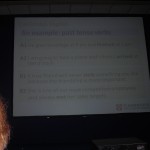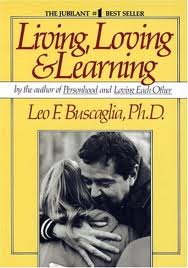 Most of us, as language teachers, often leave the classroom saying ‘Today, I taught the simple present tense OR the countable and the uncountable nouns, OR the past tense with irregular verbs.’ Yes, we do, don’t we? Then we sometimes say ‘I spent the whole week teaching the simple present tense, and they still forget the rule for the 3rd person singular.’
Most of us, as language teachers, often leave the classroom saying ‘Today, I taught the simple present tense OR the countable and the uncountable nouns, OR the past tense with irregular verbs.’ Yes, we do, don’t we? Then we sometimes say ‘I spent the whole week teaching the simple present tense, and they still forget the rule for the 3rd person singular.’

Michael McCharty, Anne O’Keefe and Geraldine Mark who gave a session entitled “What should learners’ grammar for B1/B2 learners include? Brighton, IATEFL 2011.
Actually, the Cambridge Learner Corpus has great and relieving answers to these questions. It helps us to gradually become more tolerant to inaccurate usages while our learners are trying to use the language points that have been recently introduced to. ‘Mistakes are good, they are normal, and they show the trial and developmental process’ suggested by Michael McCharty, Anne O’Keefe and Geraldine Mark who gave a session entitled “What should learners’ grammar for B1/B2 learners include? in Brighton, at IATEFL 2011.
What is the Cambridge Learner Corpus?
The Cambridge Learner Corpus (CLC) is a large collection of exam scripts written by students taking Cambridge ESOL English exams around the world. It currently contains over 135,000 scripts and it is growing all the time. It forms part of the Cambridge International Corpus (CIC). It has been built by Cambridge University Press and Cambridge ESOL (part of UCLES, the University of Cambridge Local Examination Syndicate).
If you do not have time to watch the video, here are a few highlights and some slides from the session which shows the trial of the simple past tense of the learners at different levels: Notice how the language level increases yet the mistakes occur.
The McCharty, O’Keefe and Mark say that these are positive errors and they are indicative of learning. In other words, while the students are trying to use a higher level of language these mistakes occur.
The session holders look at the usage of countable and uncountable nouns as well.
In short, it is not enough to teach anything once for our learners to use it competently. The higher the level gets, the rate of mistakes increase. Lots of repetition and recycling are essential. The Cambridge Learner Corpus helps us to prioritize what we should recycle. For example, past simple should be recycled at B Levels. It is a great resource.




